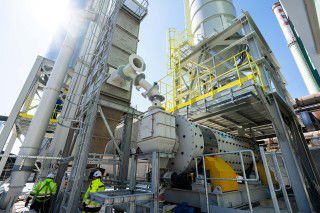This week, the cement industry is preparing for the 24th AICCE Cement Conference and Exhibition in Cairo, Egypt, which is to be held between 24-26 November 2019. The country has seen a trend of declining profits for the cement sector, but in 3Q19 dispatch volumes saw a rise of 6.3 per cent QoQ for 20 cement producers. So, is there reason for cement producers to be optimistic about cement sales going forward?
The military advantage
As of March 2019, there were 19 cement companies with 42 production lines in Egypt, of which 18 lines are owned by private companies and one by the state. Foreign ownership has risen to 52 per cent, reports Egypt Today. However, the country's cement demand of around 47Mta does not currently enable the 83.5Mta industry to run at sustainable capacity utilisation rates.
Those involved in the cement sector will be watching what happens to President Abdel-Fattah El-Sisi's recent announcement that military-run companies, such as the 12Mta El-Arish Beni Suef cement complex, should be floated on the Egyptian Stock Exchange (EGX).
If this removes some of the advantages currently extended to military companies, including lower taxes, subsidised labour and favourable access to credit, then perhaps it will help level the playing field and prevent more cement producers from closing, as happened with Tourah Cement in 2019.
New capacity
It may seem extraordinary in these circumstances to be bringing on new capacity at a time like this, but in 2017 Egyptian Cement Factory announced that it would be building a new plant in Sohag. This plant is now expected to start operations before the end of 2019. Egyptian Cement and Egyptian Steel Group founder, Ahmed Abu Hashima, can look forward to the launch of his company's new 2Mta greenfield plant in Upper Egypt, knowing that it will be supported by the group's steel business for slag raw materials.
Monitored environmental performance
While overcapacity is seen as a pressing challenge in Egypt's cement sector, producers will also have to address environmental matters, as new rules on air pollution are expected to be introduced. The Ministry of Environment announced a key strategy in June 2018 to reduce the country's pollution rate by 50 per cent in 2023.
Minister Khaled Fahmy admitted that the country will always have a problem with dust as the country by nature is made up of desert. "Dusty winds and the scarcity of rains are the main factors contributing to the increased air pollution’s rate in Egypt," he said. However, the cement sector will also have to play its part in reducing emissions.
Fuel choice is critical for margins
One favourable factor in recent months has been the Egypt's reduction in the domestic price of gas. In October 2019 Prime Minister, Mostafa Madbouli, announced that the cement sector would be able to have a set price of US$6/mBtu down from US$8m/Btu. An amendment to the environmental law in April 2015 enabled cement producers to use coal and petcoke, and these fuels continue to be used, despite their CO2 emissions, as power shortages have occurred with the use of gas supply.
Cement companies are also increasing their alternative fuel sources with agricultural waste accounting for 11Mta, waste tyres exceeding 150,000tpa and RDF estimated at about 5Mta.
Outlook
The cement sector requires higher cement volumes in Egypt to soak up its installed capacity. While new plants continue to come online and the military control the largest plant, it is hard to see a fast improvement in oversupply conditions for existing cement manufacturers in the country. In addition, with increasing environmental awareness and legislation, operating conditions are also expected to become more challenging.
